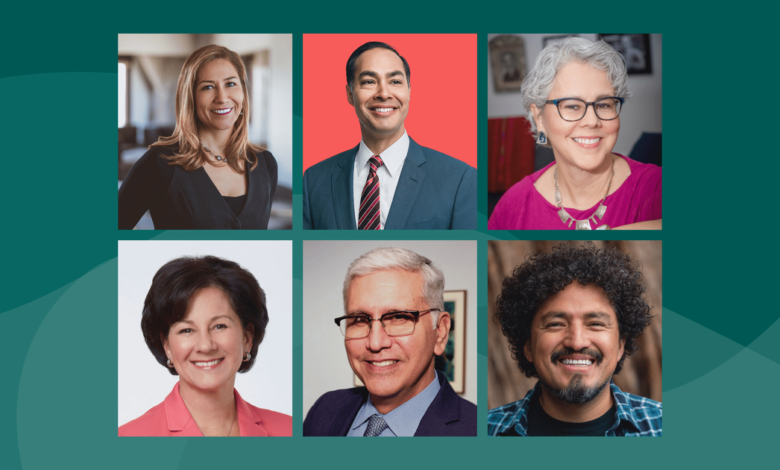Six Questions with Latino Leaders Shaping America’s Future

2. In what ways do you think societal perceptions and stereotypes impact the advancement of Latino communities within democratic frameworks, and what strategies do you advocate for challenging and dismantling these barriers?
The dominant narratives about Latinos in the U.S. are rooted in prejudice and fail to acknowledge the wide range of experiences, cultures, and concerns within and across Latino communities. The leaders we spoke to shared frustration around the national conversation, but also a hopefulness that as more Latinos gain access to positions of power and influence, they will be the ones telling their own stories, identifying priorities, and defining their role in a multicultural United States.
Julián Castro: “Latinos for generations have faced stereotypes. Those stereotypes have included that they just don’t care about voting; that they’re not particularly interested in their child’s education and want to take a more hands-off approach; that they don’t feel a sense of ownership in their community or the country. All of those stereotypes are false. What I’ve seen throughout our country is a community that deeply cares about the future of this country—[a community] that has contributed to it mightily in many different ways and works hard, aspires, and is part of the fabric of this country’s success.”
José González: “We are defined [as] others define us. For example, the idea that Latinidad is always new—we’re always immigrants—but that’s not true if you’ve been here for ten generations, right? That’s not true if your family has been here since before the founding of the state, before the founding of the country, and it comes [down] to that [level of] complexity.”
Monica Lozano: “We need to identify the issues that motivate Latinos to participate. There has historically been a misunderstanding of what those key motivations are. We have been polling the Latino community for decades. It’s not unusual for the number one issue to be centered around the economy—economic opportunity and prosperity, jobs and wages, affordable healthcare, [and] affordable housing. And yet, when you think about the national dialogue [and] where Latinos might be motivated [to participate], very often you [hear about] issues like immigration or the border, when in fact, it is not among the top ten issues. When you think about what motivates Latinos to participate, it really is about looking for economic prosperity and opportunity for them, their families, and the community at large. And I think all of that bodes well for American democracy and society overall.”
“When you think about what motivates Latinos to participate, it really is about…economic prosperity and opportunity for them, their families, and the community at large.”
—Monica Lozano
Cecilia Muñoz: “The common assumption has been since forever that if you want to talk to our community, the first conversation you have to have is about immigration. Now, obviously, that’s an important issue for our community, but it is also true that the majority of us are native-born to the United States, and a good chunk of our community has roots that go back centuries. So in some ways—and I say this as someone whose deepest expertise is in immigration policy, this is the area that has been my life’s work—but [the issue of immigration] is a big obstacle to the advancement of our community. Not because so many of us are immigrants, but because so many people assume that all we care about is immigration.”
Henry A. J. Ramos: “When you look at the demographics and the numbers, they don’t lie. We’re a massive growing force in our economy, culture, and politics. But we’re largely taken for granted. Oftentimes, the critique against the Democratic Party is that we are underrepresented in leadership, that we’re under-invested in terms of bilingual and bicultural election messaging; that we are too rarely targets of visits by the leading candidates. Certainly on the [political] right, there’s a lot of concern about the messaging—the way that the Trump forces have referred to us, calling us animals, targeting of Latinx communities as somehow enemies of the state, people who are murderers, rapists, and criminals. These are things that have truly misinformed, in a really underhanded way, the larger population about the significant contributions that we make as workers, as investors, as future and current leaders—people who are contributing more than they’re taking.”
Amanda Renteria: “There’s a unique pressure among Latinos and those who like to categorize us on where we fall on the spectrum of holding onto our cultural roots to fully assimilating into the American system. We are a big enough community and continuing to grow. Instead of seeing our cultural roots [as being] in conflict with being American, we have the opportunity to debunk [the false] trade-off between cultural roots and American assimilation. Instead, we can role-model the beauty of America because it is better for the [diverse] cultural roots that different groups of people bring to our country. This validation of our cultural diversity is what makes America truly great. Diversity is our strength.”
3. As technology continues to shape our world, what opportunities do you foresee for Latinos in leveraging digital resources and innovation within democratic contexts?
While there is so much opportunity for Latinos to leverage advancements in digital technology, barriers to access and misinformation and disinformation persist, with limited opportunities for Latinos to drive innovation. Investment in digital fluency and education are key to ensuring the Latino community can discern truth from misinformation and fully participate in the digital economy, as the takeaways below highlight.
Julián Castro: “Unfortunately, Latinos have been on the wrong side of the digital divide. At the same time they are communities [that are] often early adopters of new technologies. One of the most promising things is that the Latino community is particularly young. It’s a community that is more comfortable with new technology when it gets its hands on it. That gives me a lot of hope. What I think we need to see more of is greater educational opportunities for people to enter into technology-based careers. And as we see the emergence of AI—and we know how much that’s going to change the workforce—[it’s important] that the Latino community is prepared and able to adapt to meet this new reality.”
José González: “Technology can connect our community both in the United States and in our countries of origin like never before. But as cliche as it is, technology is a tool. And we need to support the critical thinking and education that goes with how you use that tool in a way that’s in service for democratic values, as opposed to being used against us.”
Monica Lozano: “There’s three things that we need to do. First, ensure that there’s access…It is through technology that you’re able to pretty much do everything, so imagine what that gap means in terms of your ability to effectively participate. Second is what I call digital fluency or competency: How do you discern between the information that you’re getting, the sources of that information, and whether or not it is accurate? Third, let’s make sure that we’re skilling up so that we can participate in the digital economy. Right now, Latinos are only 8 percent of the digital economy from a workforce point of view—and let’s not forget that Latinos have one of the highest workforce participation rates of any community in this country—but there are lots of things that we can do to ensure that we’re getting the training and the skill to be able to participate [in the digital economy].”
Cecilia Muñoz: “Connectivity is still an issue for our community. So in some ways it has to start there. [But] I also think the notion that technology itself, and innovation, is being driven in a certain part of the country by a certain kind of person, usually male, usually white—that that’s kind of our perception of how it’s happening—actually serves as an obstacle. I think it’s harder for us to see ourselves in those kinds of creative and innovative roles. And, I think that’s a tremendous obstacle [to] our potential as drivers of the innovations that will shape our future.”
Henry A. J. Ramos: “I think technology is a double-edged sword. There’s the good, the bad, the ugly, right? Gratefully, for the past three or four generations, [our community has] produced increasing numbers of highly talented, informed, university-educated young people who are becoming professionals and who are very adept in their use and understanding of technology and communications. And one good thing about the current positioning of our communities [is that] even as we gain more technological prowess, we remain in some ways—particularly among our more senior and middle-aged populations—very wedded to basic communication fora, [such as] person-to-person [engagements] in real-time, spoken exchange. I think in some ways, ironically, that protects us from the extent and level of misinformation that more mainstream audiences are subject to. But it’s something we have to pay more attention to and make a part of our political formation.”
“We’re a massive growing force in our economy, culture, and politics. But we’re largely taken for granted.”
—Henry A. J. Ramos
Amanda Renteria: “We must educate our communities about the challenges and opportunities of technology. If not, Latinos are especially vulnerable to disinformation because we are very engaged on social platforms but often more disconnected from mainstream sources of media where fact-checking is more prevalent. Furthermore, with emerging tech like AI, educating others about our community is even more important. We know that today’s datasets, which will be the foundation for building generative AI tools, are largely white and male. As AI evolves, it will be critical to ensure the Latino community is both protected and benefits from this powerful technology.”
Source link

